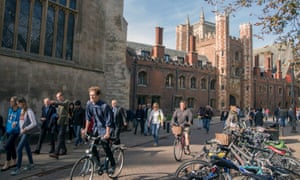
The debate sparked by a group of undergraduates at the University of Cambridge, on how and whether to “decolonise” British tertiary education by incorporating more black and minority ethnic voices, is spreading rapidly across universities and academic disciplines.
Paul Gilroy, professor of American and English literature at King’s College London, tweeted an image of Batman proclaiming “Decolonising the humanities isn’t just about Oxbridge”, and commented: “The caped crusader speaks for many of us.”
Malachi McIntosh, a Cambridge research fellow and expert on 20th and 21st century Caribbean literature, sees traditional curricula as damaging – and not just to literary understanding.
“Arguably, the narrowness of our curricula – at all levels of education – has fuelled the current political status quo, where a crude understanding of ‘us’ and ‘them’, built on a sepia-tinged nostalgia for a past that never was, is inspiring grand acts of national self-harm,” he says.
“In my eyes, the question is simple. Do we want to educate young people so that they understand the full range of experiences and perspectives that have contributed to world history? If our answer to that is yes, then we, at least in principle, support repeatedly reassessing who is read and studied and questioning what experiences and perspectives are left out. If our answer is no, then, in principle, we support limiting the exposure of the next and subsequent generations to the realities of the world they occupy.”
Emma Smith, professor of Shakespeare studies at the University of Oxford, is shocked at the venom of some of the media coverage of the debate, and links it to other recent attacks on academic freedom. “We are all in defensive mode, I think, as if whatever we say will be wrong, what with ‘Brexit lecturers’ and ‘leftie heads of colleges’ and ‘social apartheid’,” she says.
Smith, who three years ago led an initiative at her college, Hertford, to replace the portraits of long-dead men with newly commissioned photographs of female alumni, welcomes the debate on broadening the syllabus, including in her own discipline – Shakespeare studies is one area that the Cambridge students singled out as meriting a postcolonial approach.
“I think this is exciting and prioritises new ways of seeing the canon, as well as bringing in new writers,” she says. “Decolonising to me is about developing and employing the critical, historical and conceptual tools to see how ‘English’ literature – like other ‘English’ things like tea and St George – is deeply, richly, problematically interconnected with ongoing histories of travel, colonisation, empire and migration.”
Gurminder K Bhambra, professor of postcolonial and decolonial studies at the University of Sussex, is amused – almost – that it took a row at Cambridge to get the issue widely reported in the media. She has created a website, Global Social Theory – now being contributed to by academics, students and people interested in the subject from all over the world – precisely to provide a wider view.
“Some of us have been working in this area for many, many years,” Bhambra says. “However, the debate the students have started is welcome and important, if it helps more people to understand that this is not about narrowing, it is about broadening.”
source:-theguardian



